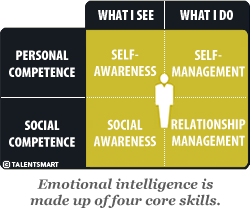EQ came into the “mainstream” (1995) after the discovery that people with average IQs were outperforming those with the highest IQs – 70% of the time. [1] How could that be?
Emotional Intelligence is the answer.
As much as we’re instructed to value intellectual pursuits, it’s actually our capacity to feel emotions, sustain connections and exhibit solid character that opens doors in everyday life. Since connections and relationships drive the entirety of business and life, your emotional intelligence will always be more important than your general intellect. [3]
How much of an impact does emotional intelligence (EQ) have on your professional success?
A LOT.
Emotional intelligence is the “something” in each of us that is a bit intangible. It affects how we manage behavior, navigates social complexities, and make personal decisions that achieve positive results. Emotional intelligence is made up of four core skills that pair up under two primary competencies: personal competence and social competence.

Personal competence is made up of your self-awareness and self-management skills, which focus more on you individually than on your interactions with other people. Personal competence is your ability to stay aware of your emotions and manage your behavior and tendencies.
- Self-Awareness is your ability to accurately perceive your emotions and stay aware of them as they happen.
- Self-Management is your ability to use awareness of your emotions to stay flexible and positively direct your behavior.
Social competence is made up of your social awareness and relationship management skills; social competence is your ability to understand other people’s moods, behavior, and motives in order to improve the quality of your relationships.
- Social-Awareness is your ability to accurately pick up on emotions in other people and understand what is really going on.
- Relationship Management is your ability to use awareness of your emotions and others’ emotions to manage interactions successfully.
After analyzing over 1,000,000 people, TalentSmart and Dr. Travis Bradberry made these conclusions about people with High EQ:
- They’re relentlessly positive.
- They have a robust emotional vocabulary.
- They’re assertive.
- They’re curious about other people.
- They forgive, but they don’t forget.
- They won’t let anyone limit their joy.
- They make things fun.
- They are difficult to offend.
- They quash negative self-talk.
Remember again, EQ is highly malleable and teachable. You can get better at it by developing habits that encourage these behaviors. Surround yourself with positive people who exhibit emotionally intelligent behaviors, and before long, your neural pathways will rewire, you’ll build myelin sheaths around those pathways, and ultimately, you’ll become more emotionally intelligent.

Citations / Read More:
[1] TalentSmart, “About Emotional Intelligence”, https://www.talentsmart.com/about/emotional-intelligence.php
[2] HuffPost, Dr. Travis Bradberry, https://www.huffpost.com/entry/9-habits-of-highly-emotio_b_12675410,
[3] Tony Robbins, https://www.tonyrobbins.com/personal-growth/how-to-improve-emotional-intelligence/
[4] https://www.psychologytoday.com/us/blog/communication-success/201410/how-increase-your-emotional-intelligence-6-essentials,
[5] https://www.tonyrobbins.com/stories/unleash-the-power/discover-your-peak-state/
